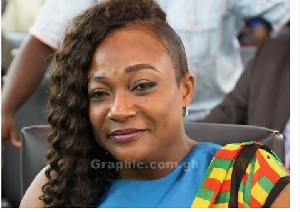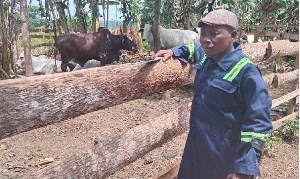Ghana’s framework which brings Non-Governmental Organisations (NGOs) under one umbrella for monitoring and effective collaboration with the Government has been commended as an effective strategy for helping to achieve the Sustainable Development Goals (SDGs).
Dr Michael Berlin, the moderator of side event on: “Unifying Efforts for the Achievement of SDGs,” at the 55th UN Commission Session for Social Development, gave Ghana the thumps up saying it made perfect sense for the two sides to work together towards the cause of humanity, instead of engaging in a blame game.
This was after Mr Seth Kwame Acheampong, the Chair of the Parliamentary Select Committee on Gender and Children, and Mr Mawutor Ablo, the Director of Policy Planning, Monitoring and Evaluation at the Ministry of Gender, Children and Social Protection, had shared information on the practice which was also commended at an earlier event.
Mr Ablo explained that the ministry had been tasking developing partners to build the capacities of the NGOs so that they could monitor government programmes on Social Protection for the feedback to be used for improvement.
He said this was paying off as NGOs such as the Challenging Heights were giving of their best in the education field.
He said the annual reports and audited accounts which the NGOs were mandated to submit also helped to track the active ones.
Mr Acheampong, for his part, said the registration of NGOs, through the Department of Social Welfare, was a positive means for government to know which organisations were working on what goals for effective partnership.
He said the partnership was critical in the interest of the people but without the registration process, the Government would not be able to identify the NGOs and facilitate their efforts.
He said though such organisations may be doing their best in their own way, there was the need to identify their roles to avoid problems, adding; “that is why we even seek to improve on this process to strengthen the partnership,” he said.
Several discussants from different countries had earlier complained that the lack of collaboration between governmental bodies and NGOs; as well as among NGOs working on similar projects would impede the progress of halving extreme poverty by 2030.
They said there should be effective monitoring and evaluation of NGO projects to ensure value for money and prevent the siphoning of funds.
To this end, there should be universally agreed measuring tools for determining best practice and poor standards, promoting transparency and accountability.
There should also be collaboration among NGOs to prevent the duplication of projects and wastage of funds, while they must fully engage the intended beneficiaries in the conception and implementation of the projects to promote community acceptance and ownership.
Some discussants suggested that governments should facilitate the engagement of NGOs with the people they intended to serve by speedily providing the requisite permits.
They should also employ people to man projects developed by NGOs to ensure their sustainability.
The 10-day Session, on the theme: “Strategies for Eradicating Poverty to Achieve Sustainable Development for All,” ended on February 10.
Madam Otiko Afisah Djaba, the Minister of Gender, Children and Social Protection, represented President Nana Addo Dankwa Akufo-Addo at the Session, held at the world body’s headquarters in New York.
The delegates adopted three sets of resolutions covering the mainstreaming of disability in the implementation of 2030 Agenda for Sustainable Develeopment; World Programme of Action for the Youth; and the New Partnership for Africa’s Development.
The event - provided various platforms for members of the Commission and other key stakeholders including civil society organisations to build on the achievements gained in implementing the Copenhagen Programme of Action adopted at the World Summit for Social Development in 1995.
General News of Sunday, 12 February 2017
Source: GNA













